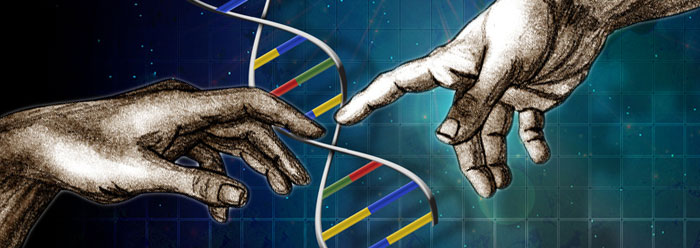Francis Collins and Karl Giberson, prominent participants of the BioLogos Forum, have suggested that Christians should believe in evolution because it has been confirmed by science. They relied on a category of DNA called "pseudogenes" to make this case in their recently published book The Language of Science and Faith: Straight Answers to Genuine Questions. However, evidence continues to mount that completely nullifies this argument.
Pseudogenes have almost the same DNA sequence as a regular gene, which codes for a protein. But a pseudogene has an embedded "stop" message inside its sequence. When first discovered, it was thought that the stop message was an accidental mutation that prevented the DNA from being processed into a full-length protein, and that therefore pseudogenes must be useless junk.1 Evolutionists believed that this "useless" DNA would provide the necessary material for natural processes to work with to "invent" the new enzymes required for one life form to evolve into another.
But that was prior to about 10 years ago, when evidence began accumulating that the "broken" bits of genes were nonetheless processed and used as regulatory features in the cell.
A review of recently discovered pseudogene function appeared in RNA, a technical journal published by the RNA Society. Its abstract's first sentence reads:
Pseudogenes have long been labeled as "junk" DNA, failed copies of genes that arise during the evolution of genomes. However, recent results are challenging this moniker.2
Those results include the observation that when certain pseudogenes are mutated for research purposes, a loss of regulatory specificity occurs in the cell. In such cases, the original pseudogenes had evidently played a necessary role. The study authors also described how some pseudogenes are "turned off" in cancer cells. If the loss of pseudogene function contributes to cancer, then this again implies that these particular pseudogenes are useful in cells.
The authors summarized their findings in the abstract:
In this review, we describe the ways in which pseudogenes exert their effect on coding genes and explore the role of pseudogenes in the increasingly complex web of noncoding RNA that contributes to normal cellular regulation.2
"Noncoding RNA" refers to RNA molecules whose data are not used in the production of a protein. Instead, these RNAs are vitally important to regulate such parameters as the timing and duration of DNA, RNA, and protein manufacture.
It is now clear that "noncoding" RNAs, which were copied from "noncoding" lengths of DNA, in fact contain vital codes! Just because they do not necessarily code for new proteins does not mean they do not code for something else the cell needs, and these researchers—publishing in a standard evolution-oriented journal—provided specific examples of important regulatory codes in these "noncoding" sequences.
Francis Collins' 2006 book The Language of God argued that since pseudogenes are useless junk, and because God would not have created useless junk, they must be leftovers from a long history of junk-producing mutations over millions of years. Therefore, according to Collins, God must have "used" evolution as part of His creative process. But the fact that pseudogenes are known to be useful nullifies Collins' and Giberson's best evidence for evolution. Have these highly esteemed researchers failed to keep up with recent discoveries about the high level of functionality found throughout DNA?
Without a source of useless "junk DNA" available to mutate infinitely, there is no longer a mechanism for new proteins to evolve.3 In other words, a Creator would have made exactly what is found in a cell's DNA—well-designed, functional components, the vast majority of which is used for vital processes such as gene regulation.
References
- Thomas, B. 'False' Gene Discovery Confirms Creation Prediction. ICR News. Posted on icr.org July 12, 2010, accessed May 16, 2011.
- Pink, R. C. et al. 2011. Pseudogenes: Pseudo-functional or key regulators in health and disease? RNA. 17 (5): 792-798.
- Thomas, B. Science Overturns Evolution's Best Argument. ICR News. Posted on icr.org December 29, 2009, accessed May 12, 2011.
* Mr. Thomas is Science Writer at the Institute for Creation Research.
